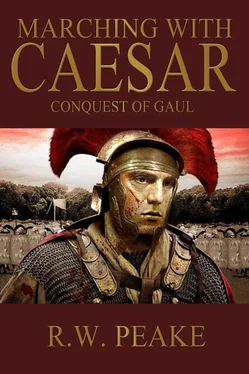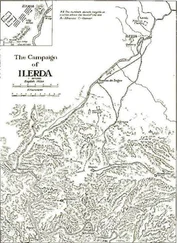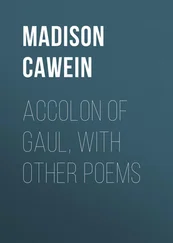R. Peake - Marching With Caesar - Conquest of Gaul
Здесь есть возможность читать онлайн «R. Peake - Marching With Caesar - Conquest of Gaul» весь текст электронной книги совершенно бесплатно (целиком полную версию без сокращений). В некоторых случаях можно слушать аудио, скачать через торрент в формате fb2 и присутствует краткое содержание. Жанр: Исторические приключения, на английском языке. Описание произведения, (предисловие) а так же отзывы посетителей доступны на портале библиотеки ЛибКат.
- Название:Marching With Caesar: Conquest of Gaul
- Автор:
- Жанр:
- Год:неизвестен
- ISBN:нет данных
- Рейтинг книги:3 / 5. Голосов: 1
-
Избранное:Добавить в избранное
- Отзывы:
-
Ваша оценка:
- 60
- 1
- 2
- 3
- 4
- 5
Marching With Caesar: Conquest of Gaul: краткое содержание, описание и аннотация
Предлагаем к чтению аннотацию, описание, краткое содержание или предисловие (зависит от того, что написал сам автор книги «Marching With Caesar: Conquest of Gaul»). Если вы не нашли необходимую информацию о книге — напишите в комментариях, мы постараемся отыскать её.
Marching With Caesar: Conquest of Gaul — читать онлайн бесплатно полную книгу (весь текст) целиком
Ниже представлен текст книги, разбитый по страницам. Система сохранения места последней прочитанной страницы, позволяет с удобством читать онлайн бесплатно книгу «Marching With Caesar: Conquest of Gaul», без необходимости каждый раз заново искать на чём Вы остановились. Поставьте закладку, и сможете в любой момент перейти на страницу, на которой закончили чтение.
Интервал:
Закладка:
“Side still bother you?” he asked gruffly.
“Not much, Pilus Prior. Only when I move suddenly.”
That prompted a bark that passed for his laugh. “Well, you’ll be doing plenty of that. I’ve decided to make you our weapons instructor in place of Vinicius. Rufio agreed that you’re the best choice.”
Stunned, I opened my mouth to protest, then thought better for a moment and shut it. There was a silence as he watched me, and mentally cursing myself, I plunged in anyway.
“That's a great honor, Pilus Prior,” I began but he cut me off.
“I don’t give a fucking brass obol if you think it’s an honor. It’s an order, and the only response I expect is ‘Yes, Pilus Prior’ or ‘Yes sir’.”
I should have shut up then, yet I couldn’t, I just had to keep going. “But sir, why me? I thought after what happened on the wall when I forgot to draw my sword you'd realize that I’m not ready for this. Maybe someday……”
I got no further; now the Pilus Prior was truly angry, and he stepped close enough that I could smell the posca he had consumed for breakfast on his breath.
“Are you doubting my judgment, Gregarius ?”
Despite saying this in a deceptively quiet voice, I had learned this was the sign that I had truly angered him, along with addressing me by my rank and not my name. Trying to remain solidly at intente , I could nevertheless feel myself leaning backwards as he thrust his face up at mine, although it was even with my chest. It was the disconcerting feeling that must come from a wolf leaping up at your throat, and I could not have been more terrified.
“N-n-no, Pilus Prior,” I cursed myself again for stammering like Artorius. “I just….I just…..nothing, Pilus Prior. I'll do my absolute best, sir.”
Just as quickly, he changed back to his normal hard-ass self and clapped me on the shoulder. “Good, it’s settled then. You won’t be expected to start training the others until you’re completely healed.”
Turning to leave, he then stopped to face me once again and said quietly, “I know you can do this, Pullus. I have faith in you, which is why I picked you. I know you won’t let me down.”
Whereupon he turned heel and walked out, leaving me a mass of confusion. How was it possible to want to kill a man and die for him, all in the same instant? Such is the nature of a great leader that he can inspire those feelings; it was a lesson I never forgot and did my best to emulate when my turn came, however poorly I may have done so.
After our recovery period, we broke camp to continue heading north, and once we were deep into Lusitani lands, Caesar gave the order to start laying waste to the countryside. It was not harvest time, so the crops were still young and green, making them somewhat harder to burn, and we were forced to get inventive. One method was to line us up, with each man standing on a row, armed with their shovel. When we were given the signal, we walked forward, using the shovel to pull out the young shoots by the roots, as we were followed by slaves who gathered them up to use as forage for the livestock. It was somewhat time consuming, but in our Century, the Pilus Prior made a contest of it, offering an extra ration of wine to the first five finishers.
“I joined the Legions to get away from the farm,” Romulus grumbled one day as we worked side by side.
“Look at the bright side,” I told him, “at least you’re not planting crops, you’re pulling them up.”
“Like that’s a big difference.”
I laughed as he kept mumbling to himself. The livestock were kept to feed all of us; it is amazing how much an army eats, and I think another secret to the success of the Roman army is that a large part of the effort and organization to sustain the army in the field revolves around feeding us, and truth be known, we ate much better than a lot of us ever had before, myself included. For the first time in my life, bread was as plentiful as meat, although I still found it funny that for most of the men, if you gave them a choice between a nicely roasted haunch of beef or pork, or a loaf of bread with some olive oil, most of them would take the bread. My tentmates always gave me grief about my taste for meat, yet I did not mind, because it meant that there was more for me. However, I do not want to give the impression that our activities in spoiling the countryside went unopposed or unmolested. The Lusitani were experts in hit and run tactics, suddenly appearing out of nearby woods to attack small groups of men, or slow-moving targets like wagons that were sent out to round up supplies of one sort or another. Our losses were small, but it was aggravating and nerve-wracking nonetheless, and it meant that none of us ever really felt we could relax, except when we were in our marching camp. Regardless of this harassment, we continued to march northward, torching every single farm or small village that we found, rounding up the inhabitants to be sold into slavery. As far as loot went, the pickings were slim to say the least, and we began to look forward to another sizable town to take and hoped that the Lusitani would be as stubborn as before.
A little more than a week later, we approached the city known as Conimbriga, which is a Roman colony built on the site of a Lusitani village. The city is near the Muna (Mondego) River, and is about a day’s march from the ocean, sitting on a plain at the foot of the hills that ring the city from the south. The scouts reported that this town had gone over to the Lusitani, but without any shedding of blood of the Romans who were living there, which was a bit unusual. Calienus thought that it was a sign that their hearts were not really in it, and the citizens of the town did not want to do anything to provoke Caesar. The word of what we had done to the first town and of our scorching of the land that we passed through naturally preceded us. Thus, when we arrived, the townspeople immediately sent a deputation of the Lusitani who were involved in the rebellion to surrender the city immediately. Caesar accepted the surrender, demanding that hostages be given by the noble Lusitani families, and a fine be paid for rebelling, even if it was one in name only, since it went directly into Caesar’s chest instead of being sent to Rome. Thus satisfied, we continued to march northward.
This set the pattern for the next few weeks; we would march through territory, destroying everything that we could not carry or consume, and whenever we approached a town, the example set by our first attack was sufficient to convince the Lusitani to quickly capitulate and offer up whatever Caesar demanded. Initially, this was fine with us, but the monotony of marching and digging, followed only by more marching and digging was beginning to get to us. We began to grumble among ourselves when we were sure the Centurions could not hear us.
“How are we supposed to make any money on this campaign?” was how Calienus put it. “When I marched with Pompey, we took a pirate town or city a week almost, and they were all taken by storm, so we had a share of the spoils. And those pirates were rich!”
It might be appropriate to relate how Calienus’ remark pertained to our situation. For as long as anyone could remember, and is still certainly the accepted practice, there is a method by which the average Gregarius can expect to enrich himself and begin a climb to higher status, which as I have already related, was very important to men like me. The custom is that if a town falls by assault, the spoils of what is taken from the town in the form of loot and slaves is divided equally among the men who participate in the sacking. However, if a town capitulates on its own, then whatever payment the general demands, whether it be in gold or other forms, particularly in confiscated slaves, goes directly to the general himself. I imagine the logic behind it, although nobody ever bothered to explain it to us, was that it is usually due to the general in command's persuasive powers that convinces a city to surrender without bloodshed, and therefore he deserves all that comes with that. Since by this time we had subdued at least a half-dozen such towns in this manner, Caesar had made a tidy sum of money. The gossip at the time was that he had accrued enormous debts, which was one reason why he was so keen to convince the towns to surrender.
Читать дальшеИнтервал:
Закладка:
Похожие книги на «Marching With Caesar: Conquest of Gaul»
Представляем Вашему вниманию похожие книги на «Marching With Caesar: Conquest of Gaul» списком для выбора. Мы отобрали схожую по названию и смыслу литературу в надежде предоставить читателям больше вариантов отыскать новые, интересные, ещё непрочитанные произведения.
Обсуждение, отзывы о книге «Marching With Caesar: Conquest of Gaul» и просто собственные мнения читателей. Оставьте ваши комментарии, напишите, что Вы думаете о произведении, его смысле или главных героях. Укажите что конкретно понравилось, а что нет, и почему Вы так считаете.












